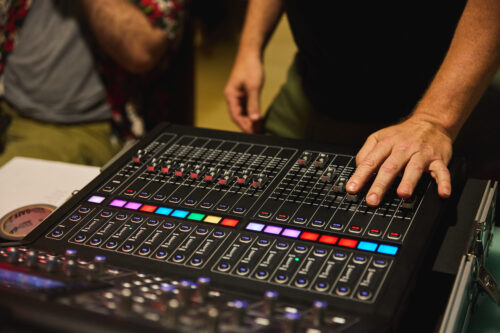Unleashing the Power of Metadata in Music

VCFA’s summer and winter residencies allow MFA in Music Composition students to receive feedback on their compositions from both faculty members and peers, as well as hear their music performed by professional ensembles.
By Jessica Muñiz-Collado, MFA (VCFA ‘14)
November 11, 2024
Metadata, although not a new concept in the music industry, has become a major topic of interest in recent years. Defined as the collection of data about a song, metadata is what gives a song its digital identity. Without accurate metadata, a song might as well be anonymous. Locating a song without metadata is like trying to find your house on a map without knowing your address.
Think of metadata as the GPS that guides your music to the right listeners.
In addition to helping listeners find your music, metadata can help boost your income from streaming and licensing deals. In this article, we’ll dive into some specifics about metadata, including:
- What is music metadata?
- Why is metadata important to the music industry?
- How can musicians properly insert metadata into their music?
- What are the best audio files for storing metadata?
What is Music Metadata?
Music metadata is the essential data that describes a musical composition. It typically includes artist information, producer, genre, album details, release date, track titles, and more. This digital information is used by music platforms, databases, and applications to organize, categorize, and retrieve music content efficiently.
Metadata serves as a cornerstone of the music industry, as it facilitates music discovery, recommendation, and rights management. It empowers users to find and organize their music collections and provides valuable insights for researchers and analysts. The Guild of Music Supervisors recommends to include as much information as possible when inputting metadata.

The Electronic Music Showcase and Songwriters Showcase at VCFA’s summer and winter residencies allow MFA in Music Composition students to listen to and celebrate each other’s work.
Why is Metadata in Music Important?
Music metadata is indispensable for several key reasons:
1. Efficiency of Discovery
Accurate metadata streamlines music organization and retrieval, enabling listeners to quickly locate specific content on their devices or streaming platforms. Similarly, music supervisors rely heavily on metadata when searching for tracks for sync projects with visual media. Music Journalist Bill Kopp writes for GRAMMY.com:
“When Kate Bush’s “Running Up That Hill” was featured on a May 2022 episode of the popular Netflix streaming series “Stranger Things,” the response was staggering. First released in 1985, “Running Up That Hill” re-entered the UK singles chart, eventually reaching the No. 2 spot. In the U.S., the song peaked at No. 3. Meanwhile, Spotify streams for the 37-year-old song increased by 9,900 percent in the U.S. alone.”
This emphasizes the importance of accurate information for securing licensing opportunities, as there is the potential for massive song growth.
2. Data-Driven Insights
Metadata also empowers music platforms such as Apple Music and Spotify to deliver personalized recommendations and introduce users to new artists and genres. Additionally, it provides valuable data-driven insights for music researchers and industry professionals.
2. Rights Management
In the digital age, it is important to properly manage intellectual property. Metadata is a valuable tool to safeguard against copyright infringements, as it ensures proper attribution and compensation for rights holders.
3. Preservation
Detailed metadata is essential for preserving music collections for future generations, as it maintains music’s accessibility and organization. It also provides valuable context for songs that helps researchers engage with the music.

Complete and accurate metadata allows others to celebrate the compositions that you’ll create and perfect at VCFA’s summer and winter residencies.
How can Musicians Properly Insert Metadata Into Their Music?
Various music management companies help musicians organize and share their metadata, such as the DISCO subscription service. However, musicians can also effectively manage metadata directly from their personal studios.
In order to begin, select a Digital Audio Workstation (DAW) that supports metadata editing, such as Logic Pro, Ableton Live, or Pro Tools. Next, gather all necessary metadata, including artist name, album artist, album title, track title, genre, tempo, release date, and any other relevant details.
Once you have collected all your information, use your DAW’s metadata editing tools to input this information accurately into each audio file. Always make sure to verify the data for consistency and correctness. Afterward, save your project and export the audio files in a suitable format, like AIFF or WAV.
When distributing your music on digital platforms or sharing it with others, ensure the embedded metadata is accurate and reflected in accompanying documentation. You can also keep a metadata spreadsheet for each song to refer back to.

At residency, Music Composition students have access to a wide variety of musical equipment to support their compositions in many different genres.
What are the Best Audio Files for Storing Metadata?
1. AIFF (Audio Interchange File Format)
AIFF files are the preferred choice for storing and managing music metadata due to their native support for metadata within the file format. AIFF files are very effective at using a song’s metadata to organize and categorize the song, leading to quick retrieval.
2. WAV (Waveform Audio File Format)
WAV files, while versatile, require third-party tools or embedding techniques for metadata storage, which can be less standardized and prone to errors. While WAV files offer a wider range of bit depths and sampling rates, making them suitable for high-fidelity audio, their lack of native metadata support can be a significant drawback for those who prioritize metadata organization and retrieval.
3. MP3 (MPEG-1 Audio Layer 3)
MP3 files, although widely used, have limitations in metadata storage capacity and compatibility. These limitations can hinder the inclusion of comprehensive information, and may lead to incomplete or inaccurate metadata representation across different music players and applications. Additionally, MP3’s lossy compression format can compromise audio quality, potentially affecting the overall listening experience.
4. FLAC (Free Lossless Audio Codec)
FLAC files, on the other hand, offer a balance between high-quality audio and metadata support. FLAC files are lossless, meaning no audio data is lost during compression, ensuring optimal sound quality. FLAC files also support metadata storage, making them a viable alternative to AIFF for those seeking high-quality audio and efficient metadata management, though AIFF is still the optimal choice.
Utilizing Metadata in Your Music
Music metadata is a cornerstone of the music industry, playing a vital role in many aspects of music content management. By ensuring accurate and comprehensive metadata, musicians can significantly enhance the discoverability, organization, and preservation of their music. This streamlined process benefits both musicians and listeners, facilitating easy access to desired content.
By understanding the nuances of different audio file formats and prioritizing metadata management, musicians can ensure their music is well-equipped to thrive in the digital age. Don’t leave your potential listeners waiting—give your music the opportunity to be discovered and preserved for future generations by updating your metadata today.
—

